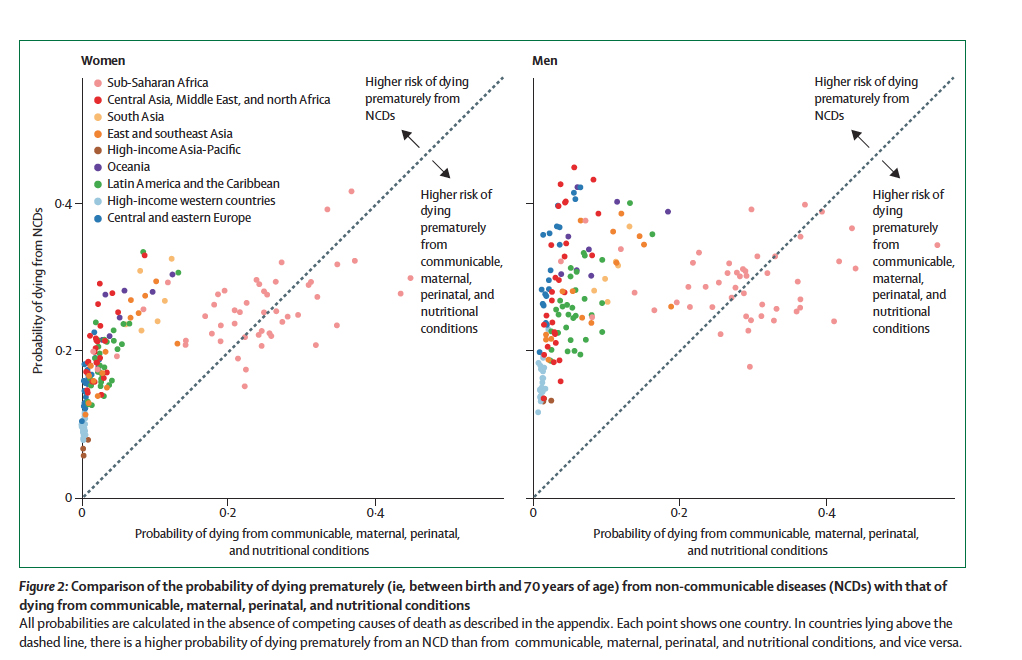This week, the General Assembly of the United Nations is meeting in New York. Among the many gatherings will be the World Health Organization discussing their stated goal of reducing deaths from 4 specific non-communicable diseases (NCD), cancers, cardiovascular diseases, chronic respiratory diseases, and diabetes by one-third by 2030. The Lancet is acting through its platform to hold the “international community” accountable.
88% of women and 89% of men had a greater chance of dying from NCDs than communicable, maternal, perinatal and nutritional combinations combined.

The graphic sums it up, we have made amazing inroads in treating infectious diseases, care for mothers and newborns and ending hunger. And the countries lagging in this area are Sub-Saharan Africa, so at least we know where to focus our efforts. So our attention is now directed non-communicable disease, diseases of our choices, personal or global, lifestyle and environment.
The good, the bad,
NCD deaths are in decline everywhere, in high-income countries like the US, the most significant reductions are in cancers, “alongside cardiovascular diseases, which have declined for decades and diabetes, the death rates of which are now declining.” Some NCD deaths can be postponed (it cannot be stopped) by prevention or treatment, especially in high and middle-income countries. So the news is that we are improving, just not “fast enough.”
As you might expect, the improvements and setbacks are unevenly distributed. It is not merely an issue of insufficient funding, or a higher or lower baseline incidence of the “fatal four,” even intent. If the rate of improvement in lowering the mortality continues in a linear fashion (that is the curve used to extrapolate Lancet’s predictions) only 19% of countries will meet the requirement for women and slightly less, 16% of countries will for men – mostly high-income countries, with low mortality, countries in central and Eastern Europe. [1] A majority (46% of countries for women and 52% for men) will fail to meet the goal unless significant changes are made. And for a small fraction, 8-13% mortality remains unchanged or has gotten worse. The United States is listed in this last group, and it is an uptick in mortality among women, not men driving the US position.
The Ugly
You knew that there would be caveats. First, only 27% of countries had high-quality data on the mortality from these diseases, after all, they come from death registries, and the quality of data entry is often unclear. So right away you have to take the conclusions with a grain of salt (unless of course, you have a high blood pressure – see below). Second, the tracking to goal is predicated on a rate of improvement based on changes at two points in time, 2010 and 2016 so they extrapolate to a straight line. But advancements in prevention and perhaps to a lesser degree treatment, are lagging indicators. Thus the impact increases over time, extrapolating that type of curve makes far more countries on the way to meeting their targets.
Accountability
I applaud the Lancet for trying to hold governments responsible for their promises. But what do they offer besides “naming and shaming”? Their recommendations are predictable and in line with the WHO recommendations.
• Reduction in tobacco and alcohol use through “taxation, warning labels, restricting availability and sales, and banning of marketing, advertising, and public smoking.” (Public drunkenness is already criminalized). The goal, a tax that accounts for 75% of the retail price of tobacco and alcohol, the later is currently taxed at about 25%.
• Reduction in blood pressure through diagnosis and treatment with generics. Salt intake, despite increasing evidence to the contrary, is once again attributed to being a cause.
It is not a coincidence that the annual meeting of the United Nations, the Lancet statement on accountability and the WHO’s budget request for $15 billion appear in the same time frame. [2] But I am afraid that Lancet can do little other than shedding light on broken and unfulfilled promises. Moreover, I doubt that shame or blame has an impact at the governmental level.
[1] Deaths attributed to alcohol were not part of the Lancet report of the WHO NCD goals and may explain why some heavy-drinking Eastern European countries fare so well.
[2] Funding for the WHO’s NCD programs come from two about evenly divided sources, assessments of the member states and additional voluntary contributions. The top three of those voluntary contributors, Bill and Melinda Gates Foundation 13%, the United States 12% and the Bloomberg Family Foundation at 11% of the voluntary contributions. And a snarky aside, should WHO have to declare their sources of funding as part of a conflict of interest? After all, the Bloomberg philanthropies are pushing hard for those WHO recommendations.
Source: NCD Countdown 2030: worldwide trends in non-communicable disease mortality and progress towards Sustainable Development Goal target 3.4 Lancet DOI: 10.1016/S0140-6736(18)31992-5
WHO Results Report Programme Budget 2016-2017




